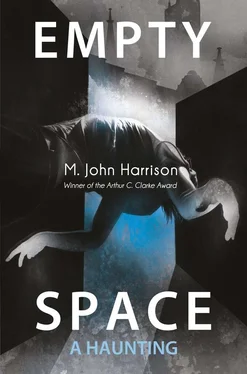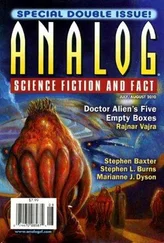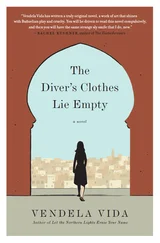‘She’s not in touch with it,’ he concluded his report. ‘And if it’s in touch with her, it’s using some part of its personality we haven’t explored yet.’
He listened for a moment, staring into the air, then laughed. ‘She lives in this room,’ he said. ‘You should see it. No, she has no idea what she is — come to think of it, nor do I. She has ten-year-old datableed technology running probability estimates down the inside of her arm. What? Yes, some kind of cheap local police thing. What do you say? Welcome to the Halo, man.’ He laughed again and then his voice went flat.
‘No,’ he said. ‘It’s too early to bring them together.’
But the next morning he appeared in the assistant’s room again, carrying two plastic cups of coffee — one mocha, one Americano — and some pastries. This time he was wearing a light shortie raincoat, spotted with rain, over twill cargo pants. His bare chest was grizzled, and the skin had slackened around the nipples, over stringy but powerful-looking pectoral muscles. If he was younger than he appeared, some odd things had happened to him.
‘So,’ he said. ‘Why don’t we sit on the bed here?’
That was hard for her to understand. She slept on the bed, she sat in the chair. She didn’t sit on the bed.
When he had got her to understand, he gave her some quite complicated co-ordinates, which even to the assistant implied an object travelling towards the Kefahuchi Tract. ‘If anything strange happens to you,’ he said, while they were eating the pastries. ‘If anything at all odd happens, why don’t you dial me up? Better still,’ he said, ‘why not use this?’ From his raincoat pocket he took out a thing like a cheap pressed-tin box with a skull in it. The box had a glass front. The skull was small, like a child’s. Sometimes it seemed to have a body, like a baby’s, a partial homunculus hanging part way through the back wall of the box; sometimes it didn’t. ‘Skull radio,’ he said to the assistant. ‘It brings down most of the major vibes. Like sucking on the universe through a wide-bore straw. If anything at all odd happens, you give me a call on this.’
‘What for?’ she asked.
Gaines smiled at her. ‘Because you don’t understand yourself,’ he said. ‘Because you’re bored. I’m leaving you the mocha, OK?’ When he was happy, he had a passive, easy look.
The assistant watched him fade back into the walls. The raindrops never dried on his coat, she thought. They stayed fresh. How did a holographic fetch bring coffee? When he had quite vanished, she pushed the tin box as far away from her as she could, until it fell off the end of the bed and on to the floor. She didn’t like it. To be sure Gaines had gone, she waited until she could feel her tailoring come back to normal; then she drank the mocha. She opened a secure pipe to SiteCrime and instructed one of her shadow operators to search the name Gaines. ‘And send me the car,’ she said. She took calls, and as a result of one of them, drove the Cadillac across town to the noncorporate rocket port, locally dubbed Carver Field. She manouevred between the tubby little tramp ships until she arrived at the bonded warehousing facility, where, forty hours after the crime occurred, she found herself staring up at the corpse of Toni Reno’s loader.
Enka Mercury had risen five or six feet higher in the air since Toni Reno found her; but Epstein the thin cop, who had brought in a cherrypicker to get a closer look, thought her rate of ascent was slowing down. Like Toni, she was still joyfully circling some invisible point. Unlike him she had begun to fade somewhat. The colour leached out of her almost as you watched, Epstein said; at the same time she was becoming transparent. In a day or two she might disappear. He had been no more successful with Enka than with Toni. She wouldn’t be caught. Whatever you did, she was out of reach. He stood shrugging apologetically in the chilly space of the warehouse and, indicating the flap of skin dangling from the vic’s armpit, said:
‘At least it looks like she was shot.’
The assistant stepped into the cage of the cherrypicker and manouevred it all around Enka Mercury’s corpse. Puffs of gas were emitted irregularly from its valves. After five minutes she set herself down again.
‘What did you get from the operator I sent?’ she asked Epstein.
Epstein shrugged. Like everyone else, he had been frightened the whole period the shadow operator was in the alley off Tupolev. Even the experienced uniforms had backed off to let it do its work. They’d rather stand in the rain all day at a traffic intersection than get near an operator. Dazzling light poured out of its mouth when it saw the corpse. ‘This is really interesting ,’ it said, watching Toni Reno through a couple of revolutions as if he were an expert performer of some kind. It vomited some more light, then approached Epstein. It had to stand on its toes to speak to him. Despite himself, Epstein bent down so he could hear. ‘I’ve got a little secret,’ it whispered in his ear. Nothing else. ‘I’ve got a little secret,’ and off along the alley, turning back once to wave shyly — more at Toni Reno, perhaps, than the cops — before it disappeared into one of the buildings, the vaporous air opalescing briefly around it as if responding to some phase transition. That morning it was running itself on a seven-year-old girl — a local mite dressed in the customary white floor-length frock of white satin sprigged with muslin bows and draped with cream lace; also what looked like her mother’s shiny high-heeled pumps — but its voice had three or four separate components, mostly male.
‘What does anyone get from an operator?’ Epstein said to the assistant.
‘They live by their own rules,’ the assistant agreed. ‘Was it the one that calls itself The Sea?’
‘I don’t know which one it was,’ Epstein said, meaning he didn’t care to know.
The assistant gave him an oblique smile. ‘It had on red fuck-me pumps,’ she predicted. ‘A seven-year-old kiddie in a wedding dress and red patent leather fuck-me pumps with five-inch heels, what do you say to that, you big hero?’
She dialled up her office and had them pipe over a holographic fetch of Toni Reno’s corpse, so that she could compare Tony and his loader side by side. In those circumstances neither of them appeared exactly real. Enka Mercury was colourless except for the faint bluish tinge to her face and hands. Toni presented as if he had been imperfectly modelled in a mixture of brown, red and yellow tones. While she came across as coy as ever, he only looked preserved and shiny and as if he was made of wood. One of his Fantin & Moretti hand-crafted moccasins had fallen off. The bodies circled at different rates until space seemed to adjust itself to accomodate them and they fell into a synchrony never experienced in life.
‘You see that?’ Epstein said. ‘It’s like they’re aware of one another.’
‘You’re uncomfortable with that.’
He shrugged again. ‘How does it happen?’
‘Perhaps it’s love,’ the assistant said.
Then she said: ‘Ninety per cent of what we see every day is an artefact of some other process. Of the things that are really going on.’ Epstein didn’t know how to reply to that. ‘Don’t you think?’ she said. Then: ‘The investigator must always take account of that.’
She stood companionably next to him for a moment, hands on hips, looking around the mostly empty space as if oil-stained floors and fluorescent warning stripes held an innate interest for her. Epstein didn’t like the way she relaxed. He found her as disturbing at close quarters as the operator had been. She was too hard to avoid. Her tailoring occupied the warehouse like another personality: everything interested it, from a momentary change in Epstein’s breathing to the sound of footsteps half a mile away. Every time its attention shifted, he caught the rank, exciting smell of hormonal gradients. She would smile at you behind that as if remembering something sexual you had enjoyed together, while pictographs ran chaos patterns down the inside of her forearm, from elbow to wrist like print from the historical times. She was some cheap cutter’s idea of the future.
Читать дальше












